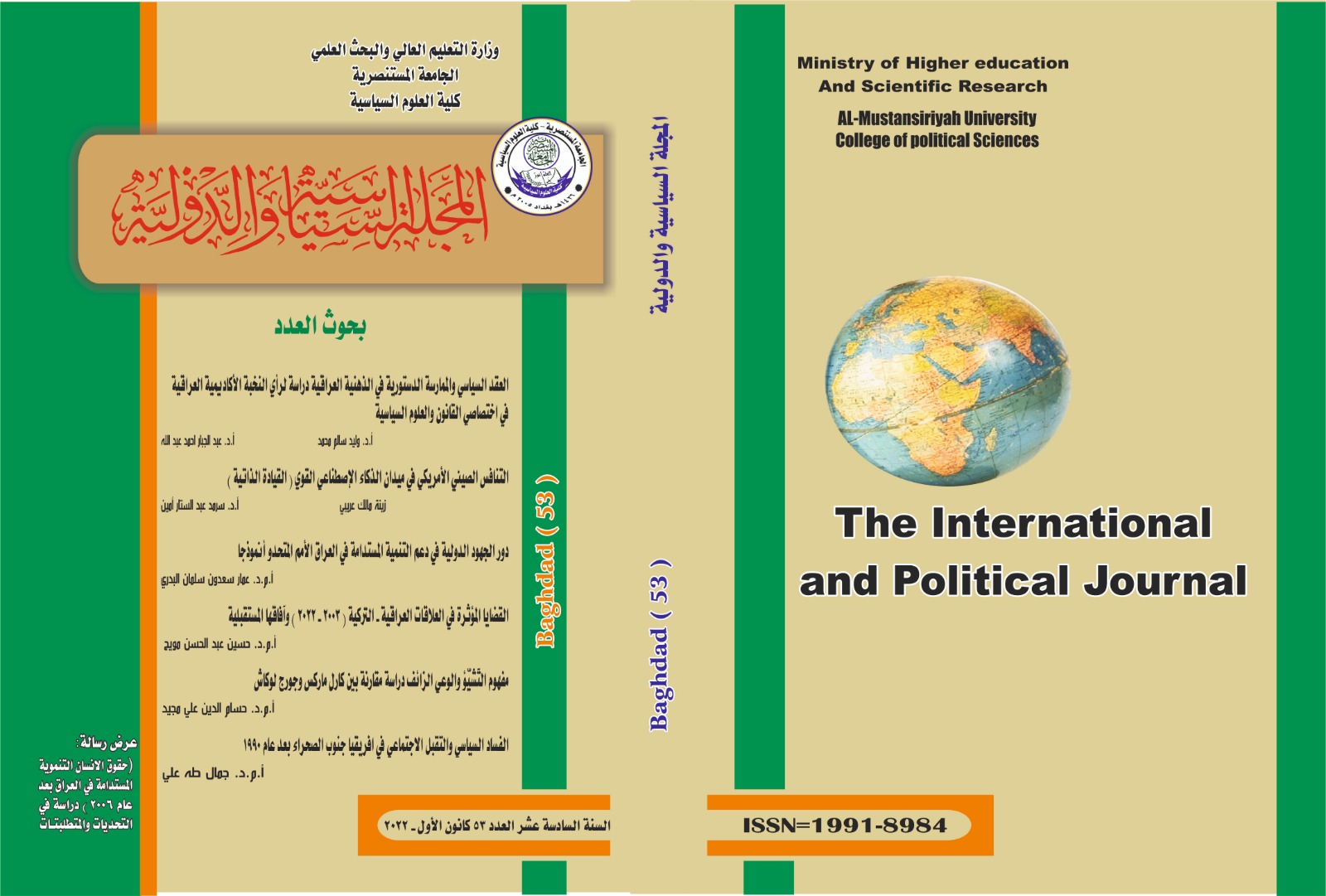Democratic Peace and Liberal Peace: Argumentative and Intentions
DOI:
https://doi.org/10.31272/ipj.i55.176Keywords:
Democratic Peace, , Liberal Peace, , Goals and Mechanisms, , Civil PeaceAbstract
Some people believe that the concept of liberal peace should be seen in relation to the thesis of democratic peace. This literature focused more on whether democratic countries are more peaceful in their foreign relations and tried to provide a theoretical and empirical explanation for this. The democratic peace thesis states the following: 1) Democratic states rarely fight each other. 2) Democratic countries tend to be more open to international trade than non-democratic ones, which creates interdependencies that prevent war from breaking out between them.3) Democracies tend to be more internally peaceful than other systems. Here, it is important to point out that the thesis of democratic peace is closely related to Immanuel Kant’s idea of “perpetual peace”. As for the liberal peace thesis, from Richmond’s point of view, it bears four main aspects that emerged from the discussions in international theory and the different historical contexts related to the subject, especially in the West. These include the four aspects of liberal peace (victorious peace, constitutional peace, institutional peace, and civil peace). Richmond noted that the peace of the victor is the result of the old realist argument that peace depends on military victory and on the domination of the victor. But the peace of the victor may result in political resistance, as in Iraq and Afghanistan. The second, constitutional peace, derives from the Kantian argument that peace is the result of democracy, commerce, and a set of universal values based on individualism. Richmond notes that "the constitutional peace struggles with those who do not want to share power, and who do not want to entrench local legal structures that might prohibit their activities." As for institutional peace, it is the peace that results from normative and legal institutional arrangements between countries that agree - in a multilateral manner - on ways to act and impose or define their behavior. This can be found in international institutions such as the United Nations as well as regional organizations such as the European Union, the African Union (AU), the League of Arab States (AL), the Organization of American States (OAS), and subregional organizations such as the Economic Community of West African States (ECOWAS), and the Southern African Development Community (SADC). The fourth aspect, (civil peace), which emphasizes the importance of the participation of citizens and civil society institutions in making peace. Unlike the other three aspects of liberal peace, the contribution of individuals rather than the state or international organization is included in this strategy.
References
اولا: المصادر العربية :
بن نهار،نايف ،2016: مقدمة في علم العلاقات الدولية، دار عقل للترجمة والنشر، دمشق، 2016
سن أمارتيا ،2016: السلام والمجتمع الديمقراطي، ترجمة: روز شوملي مصلح، المركز العربي للأبحاث ودراسة السياسات، الدوحة، 2016
ثانيا: المصادر الانكليزية :
Annan, K. A.,2000: We the Peoples: The Role of the United Nations in the 21st Century. New York: United Nations, 2000, .7. Availble at: http://www.un.org/millennium/sg/report/full.htm
Annan, K. A.1998: ‘The Causes of Conflict and the Promotion of Durable Peace and Sustainable Development in Africa.’ Report of the Secretary-General to the Security Council, UN document no. S/1998/318, April 13 1998.14
Annan, K. A.2001: ‘Why Democracy is an International Issue.’ Cyril Foster Lecture, June 19 2001. Available at: http://www.un.org/News/ossg/sg/stories/statments_search_full.asp?statID=11
Boutros-Ghali, B.1992: ‘An Agenda for Peace: Preventive Diplomacy, Peacemaking and peacekeeping.’ In Charles Hill (ed.) (2003). The papers of United Nations Secretary- General Boutros Boutros-Ghali, 1, New Haven: Yale University Press, 1992, p.104
Boutros-Ghali, B.1995: ‘A Supplement to an Agenda for Peace: Position Paper of the Secretary- General on the Occasion of the Fiftieth Anniversary of the United Nations.’ In Charles Hill (ed.) (2003). The papers of United Nations Secretary- General Boutros Boutros-Ghali, 2, New Haven: Yale University Press. 1995, p.1409
Brahimi Report,2000: Report of the Panel on the United Nations Peace Operations. UN Doc. A/55/305- S/2000/809, 21 August 2000, .3. Availble at: http://www.unrol.org/files/brahimi%20report%20peacekeeping.pdf
Call, C. T. and Cousens, E. M.2008: ‘Ending Wars and Building Peace: International Responses to War-torn Societies.’ International Studies Perspectives, 9 (1), 2008, p.3 DOI: https://doi.org/10.1111/j.1528-3585.2007.00313.x
Chan, S.1997: ‘In Search of Democratic Peace: Problems and Promise,’ Mershon International Studies Review, 41(1), 1997, .59-91 DOI: https://doi.org/10.2307/222803
Doyle, M. W.1983:‘Kant, Liberal Legacies, and Foreign Affairs, Part 2,’ Philosophy and Public Affairs, 12 (4), 1983.353
Galtung, J.1969: ‘Violence, Peace and Peace Research.’ Journal of Peace Research, 6 , 1969.169 DOI: https://doi.org/10.1177/002234336900600301
Gregor, T.1996: ‘Introduction.’ In T. Gregor (ed.), A Natural History of Peace. Nashville: VanDerbilt University Press, 1996. P.35
Newman, E.2009: “Liberal” Peacebuilding Debates.’ In E. Newman, R. Paris and O. P. Richmond (Eds.), New Perspectives on Liberal Peacebuilding. Tokyo: United Nations University Press. 2009.29
Paris and Richmond.2009: ‘Does Liberal Peacebuilding Have a Future?’ In E. Newman, R. Paris and O. P. Richmond (eds.), New Perspectives on Liberal Peacebuilding. Tokyo: United Nations University Press. 2009.11
Richmond, O.2005: The Transformation of Peace. New York: Palgrave Macmillan. 2005.2 DOI: https://doi.org/10.1057/9780230505070
Richmond, O.2006:‘The Problem of Peace: Understanding the “Liberal Peace”.’ Conflict, Security and Development, 6 (3), 2006.294 DOI: https://doi.org/10.1080/14678800600933480
Rummel, R. J.1995:‘Democracy, Power, Genocide and Mass Murder.’ Journal of Conflict Resolution, 39 (1), 1995, p.3 DOI: https://doi.org/10.1177/0022002795039001001
Schmid, H,1968: ‘Peace Research and Politics.’ Journal of Peace Research, 5 (3), 1968 .223 DOI: https://doi.org/10.1177/002234336800500301
Additional Files
Published
How to Cite
Issue
Section
License

This work is licensed under a Creative Commons Attribution 4.0 International License.
Journal Policies
All articles published in the International and Political Journal are licensed under a Creative Commons Attribution 4.0 International License. This means that the Authors can:
The journal allows reuse and remixing of content in accordance with a Creative Commons license.
Copy and redistribute the material in any medium or format.
Policy of publishing in The International and Political Journal
The journal is committed to the ethics of scientific publishing, and according to the publication ethics report of the journal.
The decision to publish is based on the value of the scientific research, to what extent it meets the conditions of publication approved, the declared policy of the journal, and its specialty.
It is based on the principles of the scientific honesty, and originality of research submitted for publication. It deals with the names of reviewers and their reports with great confidentiality.
The opinions published in the journal reflect the views of the authors, and not necessarily reflect the opinion of the editorial board.
The journal does not adhere to the publication of whatever comes to it. The time and place of publication are subject to technical considerations adopted in the editorial plan of the journal.
The journal does not abide to return the research papers to their owners whether accepted for publication or not.
The researcher is to be provided with the acceptance of publication within about 24 WEEKS. As for publication, the editorial board reserves its right in priority of publishing. The arrangement of the research papers in the same issue is subject to technical standards.
Diversify of publishing papers from solid universities and scientific centers from inside and outside Iraq is preferable.
The journal maintains hard copies and electronic archive of the published issues in addition to the publication of the research papers.
The journal also publishes the issues electronically through the website of the journal, and the official website of the Iraqi academic journals, and makes it possible to download. Thus, documenting the intellectual property of the research papers and publishing them internationally is achieved.
Terms of publication may be modified when necessary with no previous notice.
The researcher obtains a copy of his research paper. If he wishes to buy acopy of the journal, the volume costs ID 10000 from inside Iraq and $8from the outside.
The Editorial Board considers that the researcher who submits his research paper for publication in the journal has already read the terms and conditions of publication and agreed on them.
The journal publishes the research papers of the postgraduate students in special issues for this purpose.
Stages of editing and publishing:
The researcher undertakes that his research has never been published before, and has not been submitted for publication to other sides until the end of the evaluation procedures and the acceptance of publication in the journal.
The research papers submitted for publication are to subjected for preliminary examination by the editorial board to determine their suitability for the journal specialization, its policy and the safety of scientific research procedures, and then to indicate its eligibility for scientific evaluation. The editorial board may apologize for accepting the research all together or require the researcher to amend it in accordance with the journal policy before sending it to editors.
After conducting the scientific evaluation, the research paper returns back to the researcher to make the required amendments within a maximum of two weeks.
A copy of the final research paper is to be submitted to the secretariat of the journal a hard copy and a soft copy on a CD, in both Word and PDF format. The researcher is fully responsible for the typing and linguistic mistakes after submitting the full research paper on a CD.
Plagiarism checker
All research papers are subjected to Turnitin program to uncover plagiarism before being sent to scientific evaluation. The researcher undertakes a written pledge to take the legal and moral responsibility, in the event of the emergence of plagiarism or taking from the efforts of other researchers, without a reference to them. The journal uses appropriate anti-plagiarism software, such as Turnitin to check for plagiarism.
Dealing with Allegations of Research Misconduct
The Journal shall take reasonable and serious steps to identify and prevent the publication of papers where research misconduct has occurred, including plagiarism, citation manipulation, and data falsification/fabrication.
Scientific Evaluation:
Scientific evaluation strengthens the research paper submitted to the journal and helps to take the appropriate decision by the editorial board to publish it. It also benefits the researchers to improve and correct their research papers.
The research paper is sent to three evaluators in the same specialty to evaluate












